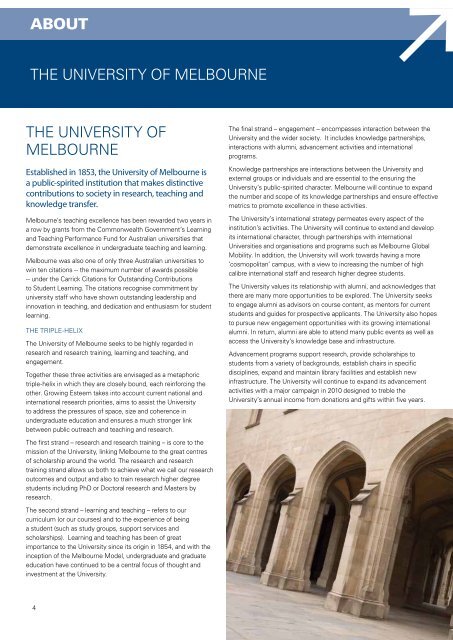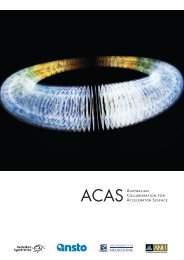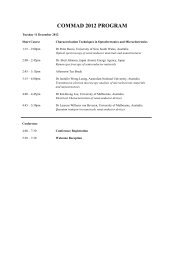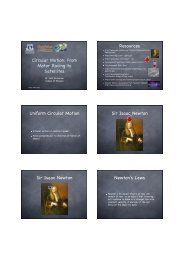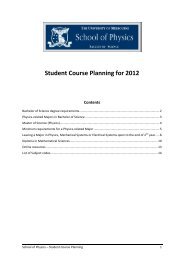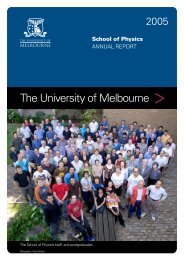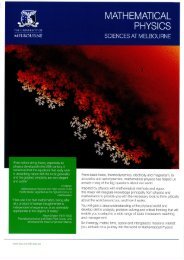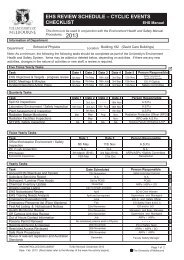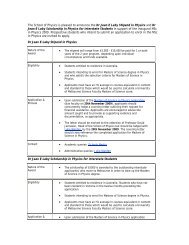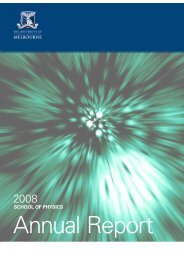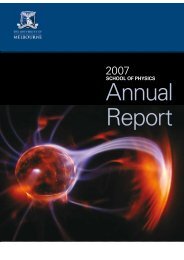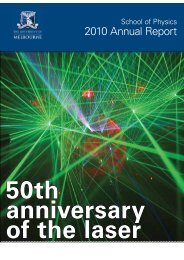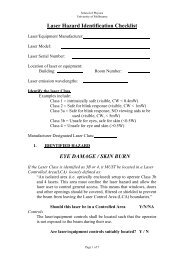Annual Report 2011-2012.pdf - School of Physics - University of ...
Annual Report 2011-2012.pdf - School of Physics - University of ...
Annual Report 2011-2012.pdf - School of Physics - University of ...
Create successful ePaper yourself
Turn your PDF publications into a flip-book with our unique Google optimized e-Paper software.
about<br />
The <strong>University</strong> <strong>of</strong> Melbourne<br />
The university <strong>of</strong><br />
Melbourne<br />
Established in 1853, the <strong>University</strong> <strong>of</strong> Melbourne is<br />
a public-spirited institution that makes distinctive<br />
contributions to society in research, teaching and<br />
knowledge transfer.<br />
Melbourne’s teaching excellence has been rewarded two years in<br />
a row by grants from the Commonwealth Government’s Learning<br />
and Teaching Performance Fund for Australian universities that<br />
demonstrate excellence in undergraduate teaching and learning.<br />
Melbourne was also one <strong>of</strong> only three Australian universities to<br />
win ten citations -- the maximum number <strong>of</strong> awards possible<br />
-- under the Carrick Citations for Outstanding Contributions<br />
to Student Learning. The citations recognise commitment by<br />
university staff who have shown outstanding leadership and<br />
innovation in teaching, and dedication and enthusiasm for student<br />
learning.<br />
The triple-helix<br />
The <strong>University</strong> <strong>of</strong> Melbourne seeks to be highly regarded in<br />
research and research training, learning and teaching, and<br />
engagement.<br />
Together these three activities are envisaged as a metaphoric<br />
triple-helix in which they are closely bound, each reinforcing the<br />
other. Growing Esteem takes into account current national and<br />
international research priorities, aims to assist the <strong>University</strong><br />
to address the pressures <strong>of</strong> space, size and coherence in<br />
undergraduate education and ensures a much stronger link<br />
between public outreach and teaching and research.<br />
The first strand – research and research training – is core to the<br />
mission <strong>of</strong> the <strong>University</strong>, linking Melbourne to the great centres<br />
<strong>of</strong> scholarship around the world. The research and research<br />
training strand allows us both to achieve what we call our research<br />
outcomes and output and also to train research higher degree<br />
students including PhD or Doctoral research and Masters by<br />
research.<br />
The second strand – learning and teaching – refers to our<br />
curriculum (or our courses) and to the experience <strong>of</strong> being<br />
a student (such as study groups, support services and<br />
scholarships). Learning and teaching has been <strong>of</strong> great<br />
importance to the <strong>University</strong> since its origin in 1854, and with the<br />
inception <strong>of</strong> the Melbourne Model, undergraduate and graduate<br />
education have continued to be a central focus <strong>of</strong> thought and<br />
investment at the <strong>University</strong>.<br />
The final strand – engagement – encompasses interaction between the<br />
<strong>University</strong> and the wider society. It includes knowledge partnerships,<br />
interactions with alumni, advancement activities and international<br />
programs.<br />
Knowledge partnerships are interactions between the <strong>University</strong> and<br />
external groups or individuals and are essential to the ensuring the<br />
<strong>University</strong>’s public-spirited character. Melbourne will continue to expand<br />
the number and scope <strong>of</strong> its knowledge partnerships and ensure effective<br />
metrics to promote excellence in these activities.<br />
The <strong>University</strong>’s international strategy permeates every aspect <strong>of</strong> the<br />
institution’s activities. The <strong>University</strong> will continue to extend and develop<br />
its international character, through partnerships with international<br />
Universities and organisations and programs such as Melbourne Global<br />
Mobility. In addition, the <strong>University</strong> will work towards having a more<br />
‘cosmopolitan’ campus, with a view to increasing the number <strong>of</strong> high<br />
calibre international staff and research higher degree students.<br />
The <strong>University</strong> values its relationship with alumni, and acknowledges that<br />
there are many more opportunities to be explored. The <strong>University</strong> seeks<br />
to engage alumni as advisors on course content, as mentors for current<br />
students and guides for prospective applicants. The <strong>University</strong> also hopes<br />
to pursue new engagement opportunities with its growing international<br />
alumni. In return, alumni are able to attend many public events as well as<br />
access the <strong>University</strong>’s knowledge base and infrastructure.<br />
Advancement programs support research, provide scholarships to<br />
students from a variety <strong>of</strong> backgrounds, establish chairs in specific<br />
disciplines, expand and maintain library facilities and establish new<br />
infrastructure. The <strong>University</strong> will continue to expand its advancement<br />
activities with a major campaign in 2010 designed to treble the<br />
<strong>University</strong>’s annual income from donations and gifts within five years.<br />
4


